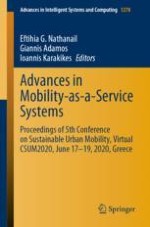2021 | OriginalPaper | Buchkapitel
Effect of Self-driving Buses on Vehicle Scheduling
verfasst von : Viktor Nagy, Balázs Horváth
Erschienen in: Advances in Mobility-as-a-Service Systems
Aktivieren Sie unsere intelligente Suche, um passende Fachinhalte oder Patente zu finden.
Wählen Sie Textabschnitte aus um mit Künstlicher Intelligenz passenden Patente zu finden. powered by
Markieren Sie Textabschnitte, um KI-gestützt weitere passende Inhalte zu finden. powered by
